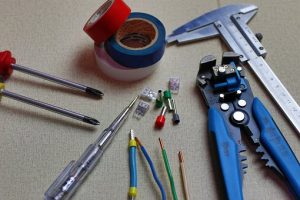Prevent Fires & Save Money: Must-Know Electrical Safety Tips for Your Workplace
You might think that only emergency electrician need to worry about electrical safety, but whether you’re a building manager supervising multiple tenants or a maintenance manager trying to repair equipment in a small manufacturing plant, there are countless situations where electrical safety is important.
In short, electrical safety consists of the practices and products chosen to minimize the risk of electrical hazards, such as fires caused by faulty wiring or power outages caused by overloaded circuits.
Leaving a photocopier plugged in overnight, for example, can continue to consume energy and increase electricity costs, while also increasing the risk of overheating and fire. Even if nothing serious happens, reducing standby time could extend the life of the device. With this in mind, consider the following 4 electrical safety tips that all maintenance teams should know.
Top 4 Electrical Safety Tips
In essence, all companies should keep the following five electrical safety tips in mind to reduce workplace risks and improve efficiency:
1. Unplug unused equipment
Leaving equipment plugged in often means these devices continue to draw electricity. These so-called “energy vampires” can waste money and increase the risk of electrical safety hazards, such as fires or blown fuses. If this happens, you may face additional costs and difficulties, such as repairing electrical wiring or completely replacing the equipment.
Therefore, a good tip is to unplug unused equipment, especially during off-peak or non-working hours. This equipment can range from treadmills in the gym to entire electrical systems that are currently unused.
2. Inspect wiring regularly
Regularly inspecting electrical wiring is a great way to be proactive when it comes to electrical safety. This way, you can identify potential hazards, such as frayed wires that could cause a short circuit or overheated wires that could start a fire.
The frequency of inspections depends on factors such as the electrical equipment and your risk tolerance, but one idea is to perform a basic inspection every time you unplug unused equipment.
3. Install ground fault circuit interrupters
Installing ground fault circuit interrupters by a qualified electrician helps improve electrical safety by quickly shutting off power whenever a ground fault is detected. A ground fault occurs when electricity takes an unexpected path, such as when passing through water, which can increase the risk of fire or electric shock.For example, GFCI outlets are commonly used in areas prone to water contact, such as bathrooms and kitchens.
4. Disconnect the appliance from the power source
Disconnecting the appliance from the power source during cleaning, inspection, or repairs can reduce the risk of electrical accidents. Additionally, during extended periods of inactivity, such as if the warehouse is closed on weekends, you can completely disconnect the appliance from its power sources.This may seem like the same thing as unplugging the appliance, but it’s different.
Other Practical Electrical Safety Tips
In addition to these five electrical safety tips, there are many other ways to reduce workplace safety risks. Some best practices vary depending on the activity and equipment used, but some other general workplace safety practices include:
• Keep electrical equipment away from water or other liquids: While GFCI outlets can provide some protection, it’s still a good idea to keep electrical equipment away from water or other liquids in case the ground fault goes undetected or if the liquid causes other problems, such as deterioration of the power cord’s protective sheathing.Always call a emergency electrician, you can call anywtime 01157940881.
• Wear Protective Clothing: Wearing protective clothing in high-risk areas, such as when repairing a furnace or boiler, can help protect yourself and potentially the surrounding area from hazards such as clothing catching fire and spreading to other electrical equipment. You may also need to wear personal protective equipment, such as special gloves.
• Watch out for power lines: Knowing best practices for power lines is important, even if your business has nothing to do with public utilities. For example, never touch a fallen power line, which can be live and highly dangerous. You may feel like you need to remove it to keep the sidewalk clear for customers, but you should never do that. Call 911 and, if possible, warn others to stay away and call a emergency electrician.
Contact Our Emergency Electrician Team
Have questions or need urgent repairs? Contact our friendly team anytime at 01157940881 or email us at [email protected] .
We’re here to ensure your plumbing problem is solved!
The technicians we collaborate with:
Local Service 24h Emergency Services 24h

